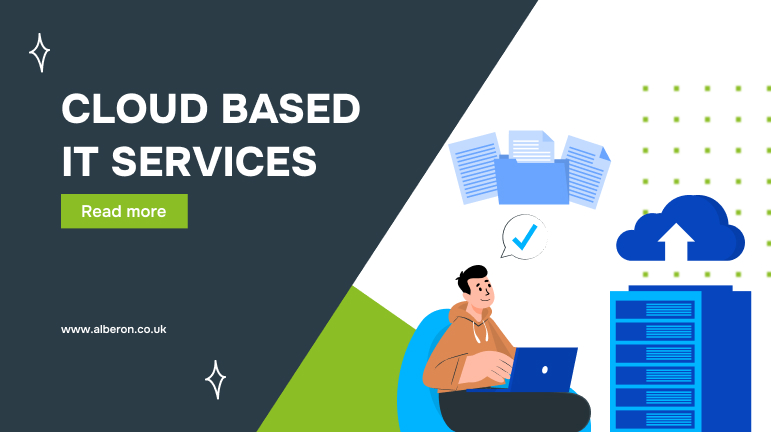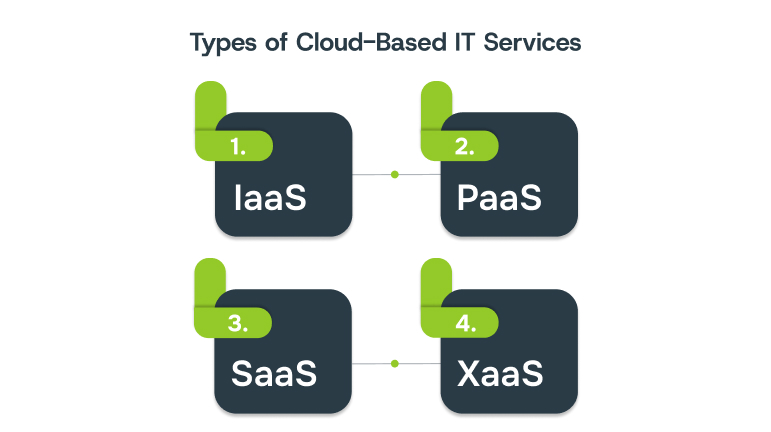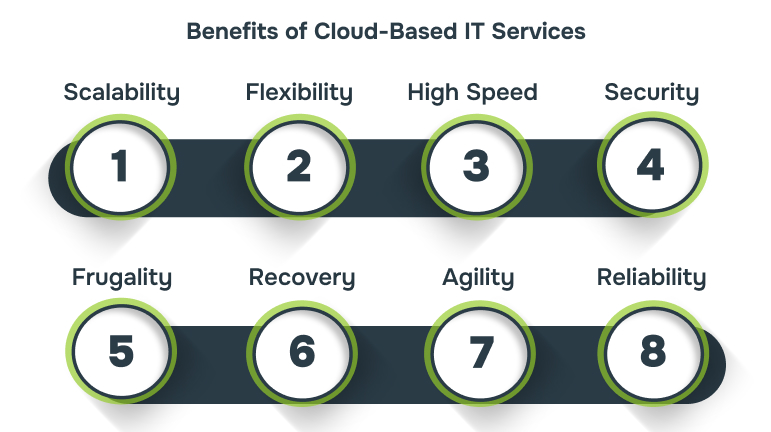Cloud Based IT Services and Solutions
Explore the benefits of cloud based IT services. Learn about IaaS, PaaS, SaaS types, and key solutions like CRM and ERP tools. Get a free consultation now!

Are you an Operations Director, IT Manager, CIO, or CFO striving to maximise your business’s potential? Many organisations today still rely on outdated systems that slow down operations, limit flexibility, and hinder growth. These legacy processes can’t keep up with the demands of a fast-paced, digital-first market. We understand how frustrating it is for SMEs, educational institutions, and non-profits to deal with inefficiencies while trying to remain competitive and agile.
That’s where cloud-based IT services and solutions come in. They offer a modern, scalable, and cost-effective way to run business operations, enabling greater agility, improved collaboration, and enhanced performance.
Recent reports show that 94% of UK organisations now use some form of cloud service, highlighting a widespread shift toward smarter, more agile IT infrastructures. Businesses are adopting cloud technologies across public, private, and hybrid platforms to streamline operations and reduce long-term costs.
In this blog, we’ll explore the key benefits of cloud-based IT services, the different types of solutions available, and how choosing the right provider can help future-proof your business.
What are Cloud-Based IT Services and Solutions?
Cloud services are internet-based computing solutions hosted by third-party providers that allow businesses to access software, storage, processing power, and infrastructure on demand without managing physical hardware. These services are hosted and managed by third-party providers, enabling businesses to use advanced IT resources on demand.
Rather than purchasing and maintaining expensive servers or software licenses, organisations can subscribe to cloud platforms that deliver scalable and secure resources through the internet. These services range from everyday tools, such as email and file storage, to complex business applications, virtual servers, and machine learning environments.
Why Choose Cloud-Based IT Services?
- Eliminates infrastructure management by shifting responsibility for hardware and software maintenance to the provider.
- Allows teams to focus on core business activities rather than day-to-day IT upkeep.
- Supports real-time collaboration across locations with secure file sharing and communication tools.
- Provides easy access to applications and data from any device with an internet connection.
- Ensures systems are always up to date with automatic patches, upgrades, and performance enhancements.
With these advantages in place, it’s clear why so many organisations are making the shift. But how are cloud services actually being used in everyday business operations? Let’s find out.
Types of Cloud-Based IT Services

Reports show that the five leading cloud providers — Microsoft, AWS, Salesforce, Google, and Oracle — hold 40.5% of the global cloud revenue. Cloud-based IT services are available in various models, each tailored to meet distinct business needs. The main types of cloud services include.
1. Infrastructure as a Service (IaaS)
Infrastructure as a Service (IaaS) is the most fundamental category of cloud services. It provides virtualised computing infrastructure over the internet, including servers, storage, networking hardware, and data center space. IaaS offers users the most control and flexibility over their IT resources, while removing the burden of maintaining physical hardware.
This model is ideal for system administrators and IT teams who need scalable and cost-effective infrastructure for hosting websites, managing big data applications, running backups, or creating development and testing environments. With IaaS, organisations pay only for what they use and can scale resources up or down as needed.
Common examples include:
- Amazon Web Services (AWS EC2 & S3)
- Microsoft Azure (Virtual Machines, Blob Storage)
- Google Cloud Platform (Compute Engine, Cloud Storage)
2. Platform as a Service (PaaS)
Platform as a Service (PaaS) builds upon IaaS by adding a layer of abstraction, offering a managed platform for developers to build, test, deploy, and maintain applications. It provides the software and tools required for application development without the need to manage the underlying hardware and infrastructure.
PaaS is particularly useful for software developers who want to focus on writing code rather than worrying about OS updates, load balancing, or database provisioning. It facilitates faster development cycles and supports continuous integration and delivery (CI/CD), API management, and automated scaling.
Well-known PaaS offerings include:
- Heroku: simplified deployment for web applications
- Google App Engine: scalable web app hosting
- Microsoft Azure App Services: cloud-hosted apps and APIs
3. Software as a Service (SaaS)
Software as a Service (SaaS) delivers fully managed software applications over the internet on a subscription basis. Users access these applications through web browsers, eliminating the need to install or update software locally. SaaS providers handle everything from infrastructure and platforms to application management and data security.
This model is popular among end-users and businesses looking for productivity tools, customer relationship management (CRM), communication platforms, and document sharing systems. SaaS allows organizations to reduce upfront costs and ensures applications are always up-to-date with the latest features and security patches.
Popular SaaS solutions include:
- Microsoft 365: cloud-based productivity suite
- Salesforce: CRM and marketing automation
- Google Workspace: collaborative tools like Gmail, Docs, and Drive
4. Anything as a Service (XaaS)
Anything as a Service (XaaS) is a broad category of cloud services that includes various on-demand offerings like Network as a Service (NaaS), Database as a Service (DBaaS), and Security as a Service (SECaaS), extending beyond traditional IaaS, PaaS, and SaaS models.
XaaS allows organisations to consume comprehensive, end-to-end IT solutions tailored to specific business needs. It promotes agility, operational efficiency, and reduced capital expenditure by turning complex services into pay-as-you-go offerings.
Prominent examples of XaaS providers include:
- IBM Cloud: extensive enterprise cloud solutions
- Oracle Cloud: integrated database and application services
- VMware Cloud: hybrid and multi-cloud infrastructure
At Alberon, we provide secure, reliable, and fully managed web hostingsolutions. We handle the technical details so you can focus on running your business.
Examples of Cloud-Based Solutions
Cloud-based solutions have fundamentally transformed how businesses manage data, collaborate, and operate daily. As digital transformation becomes a priority for organisations of all sizes, cloud technology continues to play a central role in enabling flexibility, scalability, and efficiency.
Industry leaders like Salesforce, Dropbox, and Microsoft 365 have set the standard for cloud services by offering powerful tools for everything from data storage and communication to productivity and analytics.
For small and medium-sized businesses (SMBs), choosing the right cloud-based tools can improve productivity. Our Cloud Solutions Experts have curated a list of top cloud applications that are particularly effective in helping SMBs streamline their operations, improve collaboration, and drive growth.
1. Messaging & Collaboration Tools
- Microsoft Teams – A robust platform for chat, video meetings, and team collaboration.
- WhatsApp – A widely-used messaging app for real-time communication and file sharing.
- Google Hangouts – A simple tool for video calls and instant messaging integrated with Google services.
- Slack – A popular workspace messaging app with powerful integration capabilities.
- Skype – A communication tool for video calls, chats, and VoIP services.
- Zoho Cliq – A business messaging app with organised channels and app integrations.
- Telegram – A secure, cloud-based messaging app with fast syncing across devices.
- Wire – A privacy-focused messaging app with end-to-end encryption.
- Workplace from Meta – A collaboration platform combining social tools with productivity features.
- GroupMe – A group messaging app ideal for casual and team conversations.
- Flock – A team messaging tool with integrated productivity and collaboration features.
2. Customer Relationship Management (CRM)
- HubSpot – An all-in-one CRM with marketing, sales, and service tools.
- Salesforce – A leading cloud-based CRM platform for managing customer relationships at scale.
- Pipedrive – A sales-focused CRM designed to streamline pipelines and increase conversions.
- Zoho CRM – A customisable CRM with automation and multichannel communication.
- Zendesk – A CRM solution with a strong focus on customer service and support.
- SugarCRM – A flexible CRM platform with predictive insights and automation.
- Insightly – A CRM tailored for managing relationships, projects, and sales.
- Freshsales – A CRM tool offering AI-powered lead scoring and built-in communication features.
3. Project Management Tools
- Microsoft Planner – A visual task management tool for organizing team plans and assignments.
- Asana – A versatile project management platform for tracking tasks, goals, and workflows.
- Trello – A user-friendly tool using boards and cards to manage projects visually.
- Monday.com – A customisable work OS for managing projects, workflows, and teams.
- Smartsheet – A spreadsheet-style platform for collaboration and project tracking.
- Zoho Projects – A comprehensive tool for planning, tracking, and collaborating on projects.
- Jira – A powerful project management tool designed for agile software development.
- Freedcamp – A free and flexible platform for managing tasks, projects, and team communication.
- Scoro – A business management software combining project, time, and financial tracking.
- Workfront – An enterprise work management tool for aligning strategy and execution.
- ClickUp – A unified platform for tasks, docs, goals, and team collaboration.
- Basecamp – A simple, all-in-one tool for project communication and organisation.
- LiquidPlanner – A predictive project management tool that adjusts schedules dynamically.
4. Human Resources (HR) Management
- BambooHR – A user-friendly HR software for employee data, hiring, and performance management.
- Sage Group – A cloud-based HR and payroll solution for small and medium businesses.
- Zoho People – An HR platform for automating and managing employee lifecycle operations.
- Workday – A leading enterprise cloud application for finance and human capital management.
- Paycor – A unified HR and payroll solution tailored for SMBs.
- SAP SuccessFactors – A comprehensive suite for core HR, talent, and workforce analytics.
- Freshteam – A smart HR software for recruitment, onboarding, and employee information.
- HiBob (Bob) – A modern HRIS platform for growing companies to manage people and culture.
- OrangeHRM – An open-source HR management software for core HR functions.
- Monday.com – Also used for HR task tracking, recruiting, and employee onboarding workflows.
- Ceridian Dayforce – A global HCM platform integrating payroll, HR, and workforce management.
Key Benefits of Cloud-Based IT Services

The benefits of adopting cloud-based IT services are substantial, providing businesses with both immediate and long-term advantages.
- Scalability: Instantly adjust resources up or down based on demand to maintain performance and control costs.
- Flexibility: Easily access and configure computing resources to adapt to shifting business needs, customer expectations, and market conditions.
- High Processing Speed: Cloud solutions, including private cloud deployments, deliver rapid data processing and application performance across data centres, edge environments, or colocation sites.
- Security: Cloud providers implement robust protection with encryption, access controls, and real-time monitoring to defend against cyber threats and data breaches.
- Cost Efficiency: Pay-as-you-go pricing models eliminate large upfront investments in hardware and infrastructure, making costs more predictable and manageable.
- Disaster Recovery: Built-in backup, replication, and recovery systems ensure data integrity and help maintain business operations during outages or emergencies.
- Agility: Accelerate innovation and reduce time-to-market for new products and services with easily deployable cloud environments.
- Reliability: With redundant systems and service-level agreements (SLAs), cloud providers offer high availability and dependable performance for mission-critical operations.
Beyond infrastructure and access, cloud-based IT services also enable practical, solution-driven tools that address common business challenges.
Challenges and Considerations
While cloud-based IT services offer numerous benefits, there are a few challenges and considerations businesses should be aware of.
| Challenge | What to Watch For |
|---|---|
| Data Security | Protect sensitive data by selecting trusted providers and implementing additional security measures. |
| Compliance | Verify that your cloud provider complies with relevant legal and regulatory requirements. |
| System Integration | Ensure cloud solutions integrate seamlessly with your current software and systems. |
| Downtime & Reliability | Be prepared for rare outages with backup and recovery plans in place. |
As cloud adoption grows, new trends and technologies are shaping how businesses use and benefit from cloud-based services.
Common Cloud Use Cases by Industry
Let’s explore how various industries are utilising cloud technologies in practical and impactful ways.
1. Financial Services: Driving Insights and Resilience
Financial institutions depend on cloud technologies to enhance security, analyse vast datasets, and deliver tailored customer services. The cloud also supports disaster recovery and regulatory compliance.
Key Use Cases in Finance:
- Advanced Analytics & AI: Detect fraud, assess risk, and predict customer behavior using AI-driven insights.
- Resilient Disaster Recovery: Maintain data integrity and business continuity through automated cloud backups.
- Cloud-Based CRM Systems: Enable personalised, data-driven customer interactions and service management.
2. Education: Expanding Access and Engagement
The education sector has undergone a digital transformation with cloud solutions supporting online learning, collaboration, and administrative efficiency. Students and educators benefit from accessible, flexible, and collaborative tools.
Key Use Cases in Education:
- Learning Management Systems (LMS): Host courses, track progress, and centralise educational resources.
- Interactive Virtual Classrooms: Facilitate live online classes and remote learning experiences.
- Real-Time Collaboration and Sharing: Cloud storage enables easy access and sharing of educational materials.
3. Government: Securing Data and Streamlining Services
Government agencies utilise cloud computing to improve service delivery, ensure data protection, and promote transparency. These solutions support digital services that are accessible, reliable, and secure.
Key Use Cases in Government:
- Citizen Information Systems: Securely manage and access public records in centralised cloud environments.
- Online Public Services: Enable digital processes like permit applications, tax submissions, and benefits enrollment.
- Strong Cybersecurity Measures: Cloud providers deliver high-grade security infrastructure to guard sensitive data.
4. Healthcare: Improving Access and Data Management
In healthcare, the cloud plays a pivotal role in managing patient data, enabling remote care, and supporting compliance with strict regulations. Cloud services ensure that critical information is accessible, secure, and interoperable.
Key Use Cases in Healthcare:
- Cloud-Hosted EHRs: Simplify storage, sharing, and access to patient records, promoting collaboration among providers.
- Telehealth Enablement: Supports virtual consultations and remote patient monitoring, expanding access to care.
- Secure Data Compliance: Offers reliable and compliant storage solutions that meet standards like HIPAA.
5. Manufacturing: Boosting Productivity and Predictability
Manufacturers are turning to the cloud to monitor equipment, track production, and automate maintenance. These technologies reduce downtime and increase efficiency through real-time visibility and predictive capabilities.
Key Use Cases in Manufacturing:
- End-to-End Supply Chain Visibility: Improves coordination and transparency across suppliers and logistics.
- Predictive Maintenance Solutions: Analyse data to anticipate equipment failures before they occur.
- IoT Integration: Utilise cloud-connected sensors to monitor machinery performance and optimise operations.
6. Retail Sector: Improving Customer Experience and Operational Efficiency
Retailers are embracing cloud technology to streamline operations, personalise shopping experiences, and manage inventory more effectively. The ability to analyse customer data instantly has redefined how businesses engage with shoppers and respond to trends.
Key Use Cases in Retail:
- Real-Time Customer Insights: Cloud-based analytics platforms help identify purchasing behavior and support personalised marketing strategies.
- Smart Inventory Control: Real-time tracking and inventory optimisation reduce both shortages and excess stock.
- Seamless Omnichannel Experience: Cloud solutions bridge online and in-store systems, enabling consistent customer journeys across all touchpoints.
7. Transportation and Logistics: Maximising Visibility and Efficiency
The cloud supports logistics providers by optimising routes, managing fleets, and offering real-time tracking. These capabilities boost performance and enhance customer satisfaction.
Key Use Cases in Transportation & Logistics:
- Intelligent Route Optimisation: Cloud platforms analyse traffic and delivery data to minimise delays and costs.
- Fleet Monitoring and Maintenance: Track vehicle health and performance to schedule timely maintenance.
- Live Shipment Tracking: Share real-time updates with customers to improve transparency and service.
Trends in Cloud-Based IT Services
As technology continues to evolve, several trends are emerging in the world of cloud-based IT services.
- Hybrid cloud solutions combine on-premise and cloud infrastructure to increase flexibility and security, while multi-cloud strategies use multiple providers to enhance redundancy and reduce costs. As per reports, the adoption of hybrid multicloud models in the UK is expected to rise from 19% to 26% over the next three years, while the use of multiple public cloud platforms is projected to increase sharply from 11% to 46% within the same timeframe.
- Edge Computing: The UK edge computing market is projected to reach a revenue of $12.3 billion by 2033, with an expected compound annual growth rate (CAGR) of 30.5% between 2025 and 2033. With the rise of IoT devices, edge computing is becoming increasingly important. This technology enables data processing closer to the source, improving speed and reducing latency.
- Artificial Intelligence and Automation: Cloud-based AI and automation tools transform business operations by analysing data in real-time, predicting outcomes, and automating workflows to improve efficiency. In 2025, 25% of UK businesses plan to expand their use of AI, with a strong focus on automation and data-driven decision-making.
To fully benefit from these evolving trends, it’s important to partner with a cloud service provider that understands your business goals and technical requirements.
Why Choose Alberon for Cloud-Based IT Services?
When choosing a cloud-based IT solution, it’s essential to evaluate several core factors to ensure alignment with your business goals: security standards, scalability, cost-effectiveness, customer support, and compliance with industry regulations.
- Expertise and Experience: Choose a solution backed by a team with a strong track record in delivering reliable cloud services. For example, companies like Alberon specialise in tailored cloud solutions, offering services such as cloud migration, custom software development, and integration with Microsoft Dynamics 365.
- Scalability and Flexibility: Opt for a service that can adapt to your evolving business needs. Scalable infrastructure allows you to expand or reduce resources as required, supporting both short-term demands and long-term growth without disruption.
- Security and Compliance: Security should be a top priority. Look for solutions that offer strong security features such as encryption, access controls, and regular audits, and comply with UK industry regulations.
- Ongoing Support and Consultation: Reliable support and expert advice are crucial for long-term success. Look for teams that provide continuous technical assistance and strategic guidance to help your business adapt and innovate in a rapidly changing digital environment.
Conclusion
Cloud-based IT services provide businesses with greater flexibility, improved efficiency, and reliable performance. With benefits such as scalability, enhanced security, and reduced costs, the right cloud solutions can support more effective day-to-day operations. As technology and customer expectations continue to change, cloud adoption is becoming a practical step for long-term stability and growth.
Looking to improve your IT systems with secure, cloud-based solutions? Contact Alberon today for a free consultation tailored to your business.
Frequently Asked Questions (FAQs)
1. Is Gmail considered a cloud service?
Yes, Gmail is a cloud-based service. It operates on the same infrastructure as Google Cloud, which supports a wide range of Google’s products like Search, Gmail, and YouTube. Google Cloud offers an extensive and continually expanding suite of cloud computing services.
2. What are the four main types of cloud-based services?
The four primary types of cloud-based services are:
- IaaS (Infrastructure as a Service): Virtual servers and storage (e.g., Microsoft Azure).
- PaaS (Platform as a Service): Development tools and environments (e.g., Google App Engine).
- SaaS (Software as a Service): Ready-to-use applications (e.g., Microsoft 365, Salesforce).
- FaaS (Function as a Service): Serverless computing for event-driven applications.
3. Can you give an example of a cloud-based service?
A common example is Microsoft 365, which offers cloud-based email, document storage, collaboration tools, and productivity apps that users can access from any device with an internet connection.
4. What are the top 3 cloud service providers?
The leading cloud service providers globally are:
- Google Cloud Platform (GCP)
- Amazon Web Services (AWS)
- Microsoft Azure
Get in Touch Today:
Ready to Improve your Business Productivity
Get a trusted partner to navigate your digital transformation. With Alberon, you can ensure a smooth transition, clear communication, and peace of mind.
